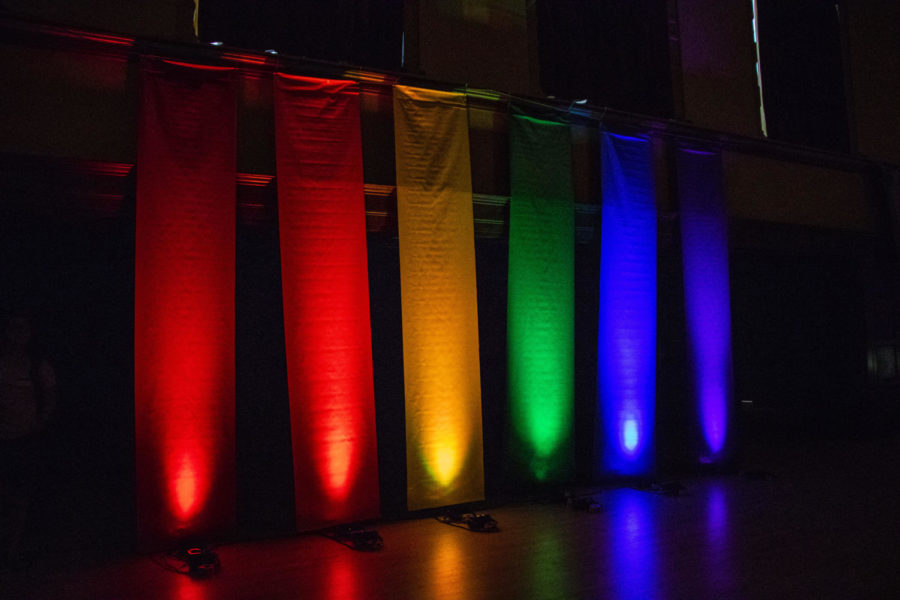LGBTQIA+ community celebrates 30th anniversary of National Coming Out Day
Iowa State students, faculty and community members meet Aug. 21, 2018, in the Great Hall of the Memorial Union to show off their pride during the LGBTQIA+ Welcome.
October 9, 2018
This year will mark the 30th anniversary of National Coming Out Day.
The event was first created on Oct. 11, 1987, when people participated in a March on Washington for Lesbian and Gay Rights, according to the Human Rights Campaign.
Coming out is the process of publicly sharing one’s identity that may have been previously hidden or not discussed.
“It was the second such demonstration in our nation’s capital, D.C., recognizing that the LGBTQ community often reacted defensively to anti-LGBTQ actions, came up with the idea of a national day to celebrate coming out and chose the anniversary of that second march on Washington to mark it,” according to the Human Rights Campaign.
The event was founded by Rob Eichberg, a psychologist and author, and Jean O’Leary, founder of Lesbian Feminist Liberation.
Coming out matters, especially since people who know someone who does identify as LGBTQIA+ are more likely to support equality laws, according to the Human Rights Campaign.
“National Coming Out Day is an opportunity for LGBTQIA+ people to get together and share their experiences within the heteronormative and cisnormative culture that we live in,” said Roslyn Gray, president of The Pride Alliance. “It is a chance for solidarity and healing but there is no requirement to come out. Some people find it beneficial and others don’t but it’s helpful that such a space exists.”
Brad Freihoefer, director of The Center for LGBTQIA+ Student Success, said they see National Coming Out Day as the time to celebrate the process of coming out and a day to continue positive energy.
“Coming out is a continual process, National Coming Out Day is a space for us to honor the process that certain members of the Iowa State community have to go through and maybe others may not,” Freihoefer said. “It is important to talk about why that is and what that process is to come out.”
Freihoefer also said coming out is an ongoing process at Iowa State and for individuals who are not “out of the closet yet,” it is important to see there is a community.
“Hopefully, it provides a safe welcoming space for folks to come out,” Freihoefer said.
Project director for diversity and inclusion and LGBTQ+ initiatives, nicci port, stressed the importance of celebrating the day and showing individuals they are valued.
“It’s not about pulling people out of the closet,” port said. “It’s more about, for those people who are out, it’s a visibility piece for the rest of us.”
Because of the climate on campus and in the nation, Gray said having a space to discuss personal experiences can be “very healing.” Gray also spoke about various organizations on campus, such as The Center, that works to help student feel accepted.
In celebration of National Coming Out Day, The Center is hosting a pop up photo shoot. It will be held from 10 a.m. to 2 p.m. at The Center, 1064 Student Services Building. The photo shoot will have pride flags and other props to use for the photos.
“It takes a lot of bravery and a lot of courage to come out and talk about your story and it is very personal,” Freihoefer said. “Coming out is still a really big deal and it can have impacts across different components of student life. When someone chooses to come out, it may be on this day, it may very well not be, it may be on a whole host of complexities in a student’s life that determines when will be the time for them.”
Freihoefer gave advice on what to do if someone shares their coming out story.
“Start with a ‘thank you,’ if someone has the honor of someone coming out to them, it is important to say ‘thanks’ because it takes a lot of courage to say that,” Freihoefer said. “Be supportive; ask if there is anything you could do; if it’s something with gender, ask what pronouns you should call them by.”
















